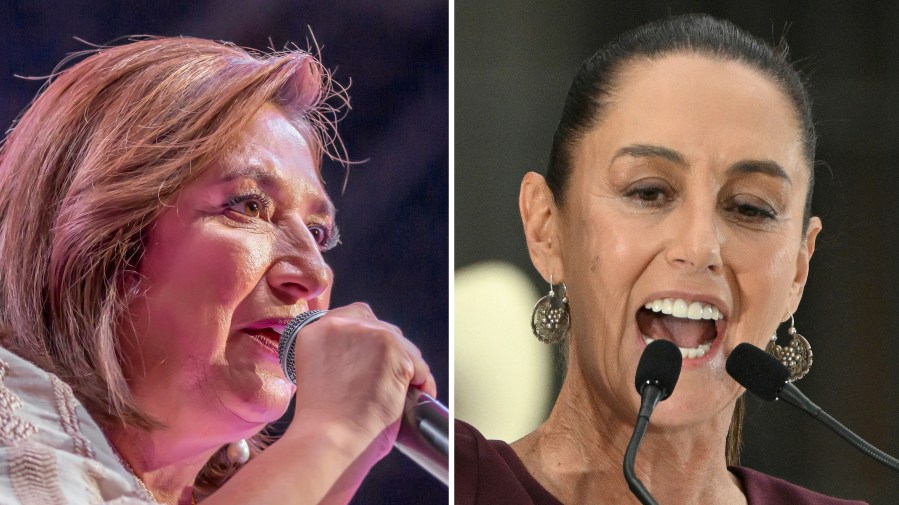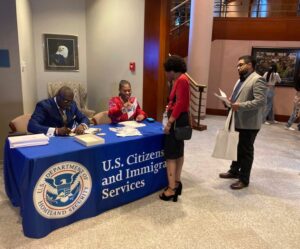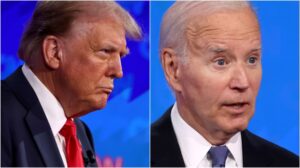North America at a crossroads as Mexico kicks off trio of major elections


Looming elections across North America could upend a decades-long integration process as the continent’s three major nations face sharp choices between populism and traditional liberalism.
The interactions among Mexican, U.S. and Canadian leaders stand to shape the political and economic future of a free trade zone with complex and profitable supply lines and consumer markets on one hand — and increasingly fortified borders on the other.
On Sunday, Mexico will choose between former Mexico City Mayor Claudia Sheinbaum, who shares the centralist, populist vision of outgoing President Andrés Manuel López Obrador, or a return to the institutionalist structure favored by Mexico’s traditional political parties, former bitter rivals banded together behind opposition candidate Xóchitl Gálvez.
Canada, a country that’s yet get its taste of 21st century populism, will head to the polls on or before October 2025; for the moment, Liberal Prime Minister Justin Trudeau is tanking in the polls, and populist Conservative Pierre Poilievre is gaining strength.
And of course, this November features the heavyweight matchup in the U.S.: President Biden and his traditional liberal approach to governance vs. former President Trump’s nationalist populism.
“Elections matter, and leaders matter for that purpose. And we have two different kinds of leaders for each of the three countries, and the mismatch between them could make a difference,” said Roberta Lajous, a fellow at the Wilson Center’s Mexico Institute and former diplomat who represented Mexico as ambassador to four countries, including Cuba from 2002 to 2005.
“So we really have to look at the future of North America carefully. We have to see who wins in each of the three countries, because a lot is at stake. And from the point of view of North America, what is at stake is the possibility to continue in a path greater economic integration or the path to a bumpy road,” added Lajous, who openly supports Gálvez.
In a global trade environment increasingly defined by major trading blocs, North America, under the auspices of the United States-Mexico-Canada Agreement (USMCA), is up against blocs including the European Economic Area and Asia’s Regional Comprehensive Economic Partnership in a race to build competitive and sustainable webs of supply chains and consumer markets.
Since the coronavirus pandemic, both Mexico and Canada have overtaken China as the United States’ top trading partners — the U.S.-Mexico and U.S.-Canada trade relationships are the two largest bilateral trade relationships in the world.
Migration dominates
But trade is not the center of attention in the U.S. and Mexican elections.
“The relationship in general is very focused on the U.S. seeking for Mexico to reduce the number of people arriving at the U.S. southern border,” said Stephanie Brewer, director for Mexico at the Washington Office on Latin America, a human rights-focused research and advocacy organization.
Mexico under López Obrador has been a key player in U.S. border policy under both Biden and Trump, including by dialing Mexican immigration enforcement up or down to influence the number of migrants showing up at the U.S.-Mexico border, and by agreeing to receive third-country nationals expelled by the United States.
That dynamic, or something like it, is likely to remain regardless of who wins on Sunday and in November.
“The policies are going to differ, but I think the underlying sort of common objective of whoever wins the White House is to stem illegal migration to the United States. How that plays out and which policies are enacted will obviously be different depending on who stays in power in the United States, but I do believe that no matter what they’re going to have to deal with Mexico on this issue,” said Lila Abed, acting director of the Wilson Center’s Mexico Institute.
The core of Trump’s immigration policies, such as Title 42 or the Migrant Protection Protocols — better known as “remain in Mexico” — depended on López Obrador agreeing, sometimes under the threat of tariffs, to take in a number of foreign nationals.
Biden’s approach has been less blunt, but his administration has at all costs avoided being critical of López Obrador while enjoying the results of a massive Mexican crackdown that’s cut border encounters from just over 300,000 in December to 179,725 in April.
The administration is widely believed to be holding back on its own crackdown on asylum until after Sunday’s election, where Sheinbaum is the heavy favorite.
“Claudia Sheinbaum, when asked about migration policy, has emphasized and often really limited her answers to the need to address the root causes of migration,” said Brewer.
“And that, of course, has been also a major talking point for President López Obrador, while at the same time López Obrador has in practice continuously ramped up containment measures and detention measures and militarized borders and imposed visa requirements. And currently, the Mexican government is returning large quantities of people from the north of Mexico to the south of Mexico.”
Brewer added that Gálvez has been especially critical of López Obrador’s acceptance of U.S.-imposed migration policies, whether under threat or through other diplomatic means.
“What we haven’t heard or seen very clearly, from anyone, are plans to really transform these policies or Mexico’s participation in these types of U.S. border policies and to really transform the current model of quote-unquote, ‘management’ of migratory flows, because the current model is to concentrate an enormous population of migrants and asylum seekers in Mexico, which is an unsustainable model,” she said.
Who is Claudia Sheinbaum?
If polls are correct and Sheinbaum wins by a wide margin on Sunday, López Obrador will be handing over power to a hand-picked successor who has for years sung the praises of what the term-limited incumbent calls the “fourth transformation,” the dogmatic base of his movement to reengineer power structures in Mexico.
Sheinbaum, who often touts her scientific credentials as a PhD energy engineer and as an environmentalist, became mayor of Mexico City more than a decade after López Obrador left the post.
As mayor, she emulated López Obrador’s policies, including a controversial emphasis on construction of urban highways known as the segundos pisosor “second stories” of Mexico City’s existing ring roads.
Sheinbaum has described her governance goals as building the segundos pisosof the fourth transformation, leaning heavily on the symbolism surrounding the highly popular López Obrador.
That’s led both friend and foe to wonder whether and how far Sheinbaum would distance herself from López Obrador’s more contentious policies.
“We don’t know who Claudia Sheinbaum really is. We don’t know if she will continue to follow word-for-word whatever López Obrador says, or if she will be her own self. So we don’t know, one. Two, between the moment that AMLO started his administration and today, many contentious issues have risen within USMCA,” said Lajous.
Beyond migration
Bubbling USMCA controversies likely await Mexico’s first female president, whether it’s Gálvez or Sheinbaum, potentially even eclipsing the political relevance of migration in a second Biden or Trump term.
“One would hope that the next Mexican president would enact policies to reverse the measures that are in violation of the USMCA,” said Abed, referring to a slew of López Obrador policies from imposing state control of energy markets to banning genetically modified corn.
Gálvez is all but certain to take a more liberal approach to economic management, particularly as the country’s fiscal deficit has soared under López Obrador and his penchant for massive pet projects, though both Sheinbaum and Gálvez have pledged to maintain direct cash transfer assistance programs that seem to have made a dent in the country’s poverty rates.
Energy policy is already a source of tension between the United States and Mexico, though one that has been obscured by discussions on migration.
López Obrador has reemphasized state control of energy production and distribution, bolstering state-owned oil company PEMEX and the Federal Electricity Commission (CFE).
“There’s an inherent contradiction between what Claudia Sheinbaum has been signaling — though not openly stating — in regards to what her policies with renewables would be with the fact that she has explicitly doubled down on the predominant role that PEMEX and utilities company CFE would play in her administration. You can’t have your cake and eat it too,” said Arturo Sarukhan, who served as Mexican ambassador to the United States from 2007 to 2013.
Concerns about the security of foreign investments and global economic trends have contributed to a slowdown in new foreign investment, with the exception of Chinese investment that’s looking to cash in on nearshoring, while circumventing trade barriers set between Washington and Beijing.
“More than anything, I would highlight the following and that’s Chinese investment in Mexico. I think that that’s a real red flag for the United States, because it actually puts at risk the national security of the United States in terms of certain technologies, critical infrastructure, sensitive data,” said Abed.
Skepticism over security reforms
One of López Obrador’s most significant legacies will be the expansion of military control into traditional civilian areas, from running customs at borders and ports to construction and administration of large infrastructure projects.
“I think [Sheinbaum] has signaled that she will not do a U-turn on the growing encroachment of the armed forces in a number of public policy matters that have nothing to do with national security or national defense. Xóchitl Gálvez, I think, would try to rein in some of the extra duties that López Obrador has given the armed forces over these past years,” said Sarukhan.
But many Mexicans are skeptical of changes in security policy. Since 2006, the military has taken a central role in fighting organized crime, with each successive president creating a new national police force that in effect is manned by soldiers.
López Obrador’s version of a militarized police, the National Guard, has limited its frontal engagements with non-state armed groups and instead retreated to a patrol role, while also enforcing his migration crackdowns.
“Gálvez says that a priority will be making sure the National Guard is under a civilian command, but we haven’t heard of proposal that would really significantly deviate from deployment of the armed forces in security tasks. Claudia Sheinbaum, of course, pledging to continue with the current model of militarization as well,” said Brewer.
“Once again, there’s reason for voters to be skeptical of the extent to which a change in ruling party would really bring about that change because the past three administrations — which have all been changing parties — have not brought about the needed change.”








